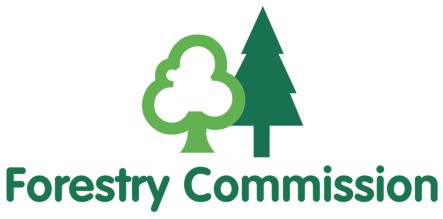Annual Equality Monitoring Report 2023 to 2024
Published 3 September 2024
Applies to England
At the Forestry Commission, we want our workforce to better represent Britain’s communities. We also know that we are stronger as a business when our workforce is diverse and inclusive.
Everyone who works for our organisation is unique and we want to ensure that they are truly valued and can reach their full potential. This report forms part of our requirement to publish workforce data to demonstrate our compliance with the Public Sector Equality Duty (PSED) and the Equality Act (2010).
The PSED requires us to publish information about our employees, broken down by relevant protected characteristic, to show how the Forestry Commission is having due regard to:
- eliminating unlawful discrimination, harassment and victimisation and other conduct prohibited by the Equality Act 2010
- advancing equality of opportunity between people from different protected characteristics
- fostering good relations between people from different protected characteristics
This report not only meets our statutory obligations, but it also highlights the work that is underway to promote equality, diversity and inclusion across the organisation.
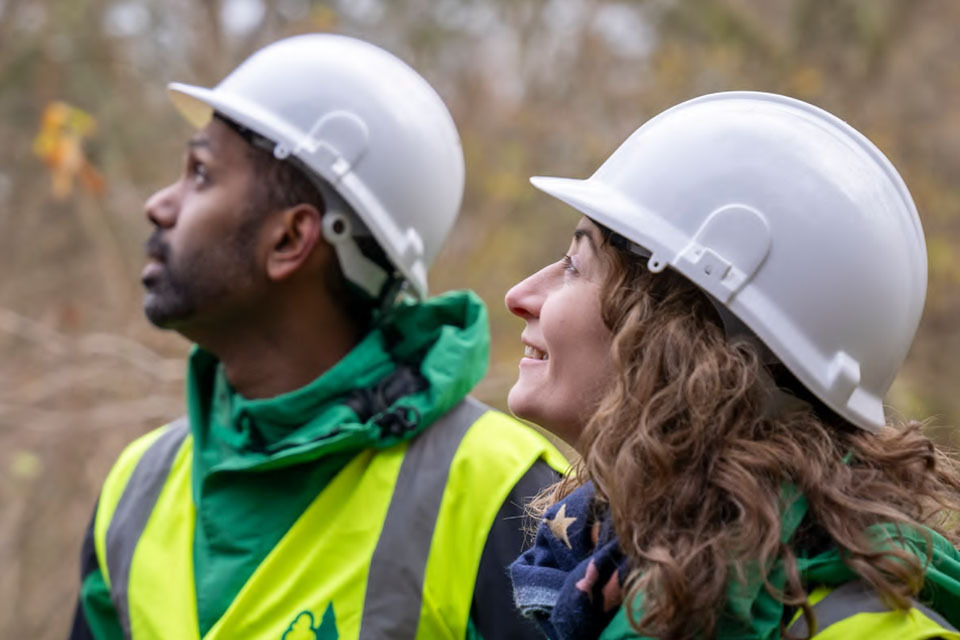
Copyright Forestry Commission
Our people: in numbers
This report is based on our workforce figures across Forestry England, Forest Services, Forest Research and the Commissioners’ Office for 31 March 2024. The report does not include casual staff.
This data shows some progress since 2019 with regards to the recruitment, retention and progression of female, ethnic minority and disabled staff.
On 31 March 2024, the Forestry Commission had 2339 employees. Of these:
- 53% were male (down 2%)
- 47% were female (up 2%)
- 7% are from an ethnic minority background (down 1%) of which 4% are other than white minorities (up 1%)
- 88% identified as white British (5% did not disclose)
- 7% told us they have a disability (up 1%)
- 57% of employees were over 40 years of age
- 41% of those in senior management were female (up 1%)
- 59% of those in senior management were male (down 1%)
- the middle female salary is equal to the middle male salary
- the average hourly rate for males is 2.84% higher than females
- 6.1% of successful applicants following interview were from an ethnic minority background (up 2%)
- 8.9% of successful applicants following interview had a disability (up 2.5%)
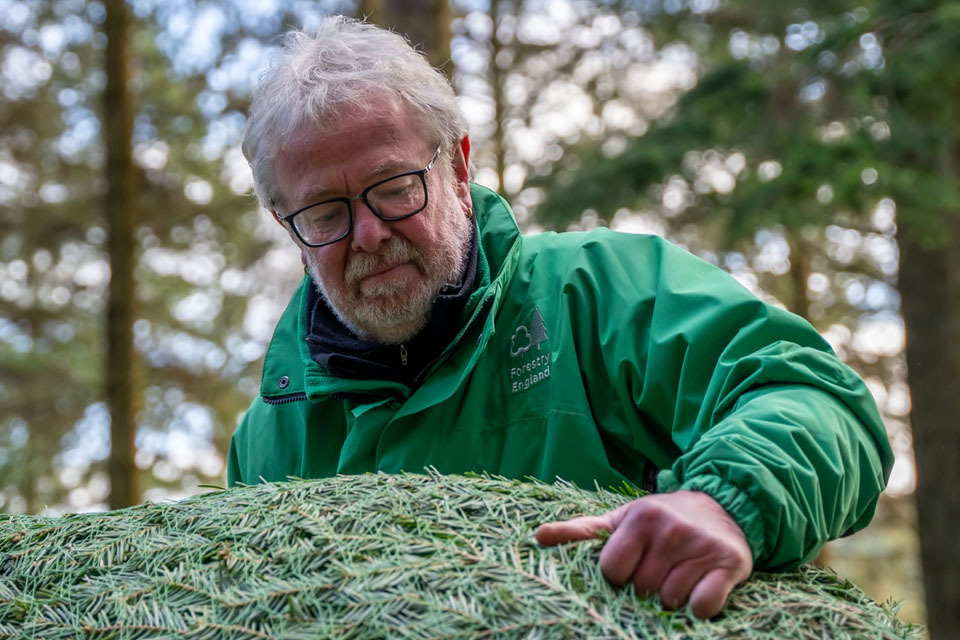
Copyright Forestry Commission
Strategy and oversight
Diversity and Inclusion strategy 2021-2024
Our Diversity and Inclusion (D&I) strategy, continues to guide our work and brings together our mission to make the Forestry Commission inclusive to all.
Our strategy is focused on 5 memorable actions:
Develop a more inclusive culture: to create working environments and recreational spaces where people are valued and respected for being themselves.
Grow a more representative workforce: to have a workforce that better represents all the communities we serve.
Listen using diverse insights: for all programmes, policies and services to be inclusive to all.
Learn, growing in capability and confidence: to be an organisation where equality, diversity and inclusion is everyone’s responsibility.
Share our experiences and learning: raise awareness, share best practice and celebrate success.
Everyone Belongs Board
The Everyone Belongs Board is in its second year and is establishing its role in providing oversight, assurance and co-ordination of the Forestry Commission’s programmes of work relating to equality, diversity and inclusion. The steering group has senior representatives from across the organisation and its divisions, who will champion a culture where everyone is welcome and included.
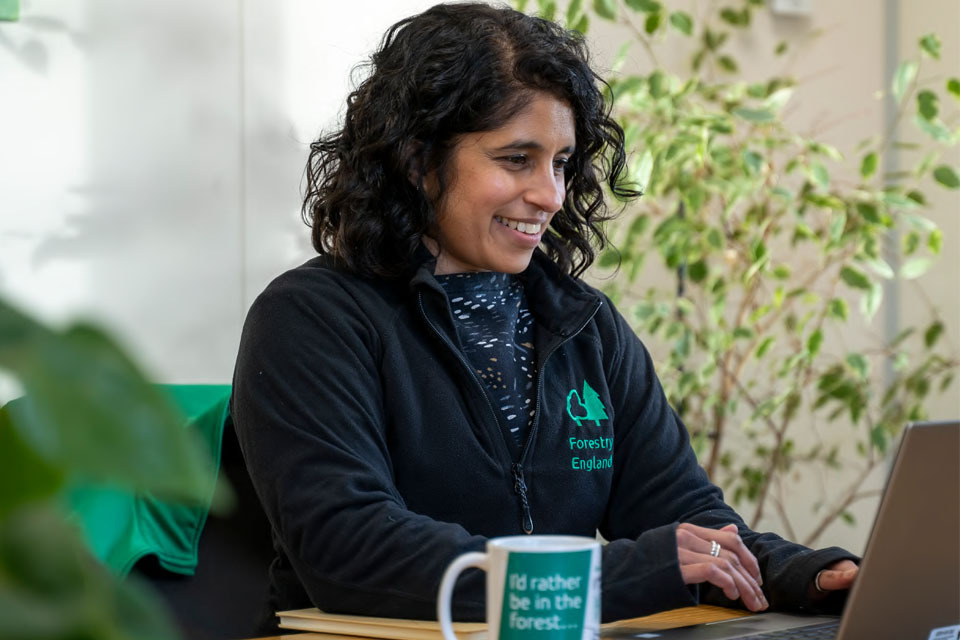
Copyright Forestry Commission
Training and development
Equality, diversity and inclusion training
The ‘Equally Yours’ board game continues to be rolled out, with the aim of helping staff discuss issues of diversity and inclusion openly and better understand their colleagues, visitors, and communities. So far, 828 members of staff have received Equally Yours training and it continues to be a core element of the Professional Manager Programme (PMP).
Over 100 people received the creating an inclusive workplace training programme, which explores themes such as micro-aggressions, unconscious bias, privilege, allyship and much more.
Diversity in leadership development
Two of our employees have graduated from the Stepping Up Diversity Leadership programme. This programme aims us to nurture the next generation of diverse leaders to strengthen the talent pipeline.
Webinars
Forestry Commission staff had the opportunity to access new neurodiversity awareness sessions for managers and staff developed by the Defra (Department for Environment, Food and Rural Affairs) Health and Wellbeing team.
During National Inclusion Week 2023 (25-29 September) we held a webinar on Equality vs Equity with Jenny Garrett OBE, which was attended by over 161 Civil Servants (including the Border Force in Calais!).
For Menopause Awareness Month 2023 in October we hosted a webinar which was open to all Forestry Commission employees offering sensitive, empathetic training in the issues around menopause.
Reverse mentoring pilot
A reverse mentoring pilot scheme was established as a unique platform where a reverse mentor from an under represented group is paired up with a senior reverse mentee, focusing on supporting them to understand the experiences of staff with certain protected characteristics.
Sunny Loram, Operations Admin Officer was one of the reverse mentors who took part in the pilot. They were paired with Dr. Gareth Parry, Forest Management Director – Yorkshire District.
Sunny said:
I found the reverse mentoring scheme really useful, both as the mentor and also taking things on board from my mentee as well. It was nice to be able to see how things worked and were going ‘higher up’ whilst being asked for my honest input as a person of multiple marginalised identities, so I could offer a different perspective, unconsidered ideas and possible solutions based on my own experiences. I think that the scheme is invaluable not only in bringing a human connection to what can be difficult topics, but allowing time for people within the workplace who may never meet to be able to take some time out to exchange stories and offer input and assistance to the day to day working life.
Dr. Gareth Parry said:
I jumped at the opportunity to participate in reverse mentoring. Equality, Diversity and Inclusion (EDI) are close to my heart and something that I have tried to champion throughout my career. Although it doesn’t look like it on the surface, there are reasons that I have felt like an outsider in my chosen career field. I’m also well aware of the limits of my understanding, so what better way to learn than by listening to someone with lived experience. My discussions with Sunny were really valuable, I came away with a much better appreciation of the challenges that some people face. They also shared useful ideas about how to build a more inclusive workplace, which is something I’m taking back to Yorkshire.
Don’t underestimate how important EDI is. Yes it makes for a better place to work, but more diverse and inclusive teams tend to be higher performing and make better decisions. Many of the improvements that Sunny suggested were simple and would benefit everyone, not just people with different needs and backgrounds. I would highly recommend that other senior leaders take up the reverse mentoring opportunity when it arises again.
Inclusive facilities and provision for staff
A working practices project group was established in January 2024 with the objective of creating a toolkit that fosters diversity and inclusion in all aspects of meetings, including timing, catering, social aspects and religious observances.
A quiet room was opened at National Office in Bristol in January 2024. This will be particularly useful for staff of all and no faiths who need somewhere to pray, meditate, contemplate or need some time to reflect during the working day. A survey has been carried out across various other sites and offices to establish what other provision is already in place and where this can be extended to.
Supporting and growing our staff networks
The Forestry Commission has 4 staff networks, which continue to thrive. These are:
- Rainbow Canopy (plus LGBTQ+ supporters) Staff Network
- Disability, Neurodiversity and Carers Staff Network
- Women’s Staff Network
- REACH (Race Equality and Cultural Heritage) staff network
The networks contribute to diversity and wellbeing communications through blogs, news stories, marking awareness days promoting diversity and inclusion, as well as organising events and ‘Lunch and Learn’ sessions.
Rainbow Canopy celebrates Pride and goes further afield with the Museum of English Rural Life
In June 2023, offices and visitor centres displayed rainbow designed flags and other materials, and an information leaflet was created to share why we celebrate Pride Month in our organisation.
Rainbow Canopy also held a listening circle with members and allies, including Forestry Commission Chief Executive Richard Stanford and members of the Executive Board.
The listening circle was an open and honest forum where LGBTQ+ colleagues shared their lived experiences, including some of the challenges they faced in the workplace as well as some of the many positive aspects of LGBTQ+ inclusion across parts of the Forestry Commission.
It was clear that some LGBTQ+ colleagues have a different experience to others depending on where they are located, and there is still work to be done for us to enable all our LGBTQ+ colleagues to feel safe and included. Rainbow Canopy welcomed the commitment from our leaders to continue championing of LGBTQ+ inclusion, of inclusion for all staff, and to stand against discrimination of any kind.
During LGBT+ History Month in February 2024, members of Rainbow Canopy took part in an event at the Museum of English Rural Life (MERL) in Reading. The day formed part of the museum’s Further Afield project, which is experimenting with community driven museum curation and working in partnership with groups which have been historically underrepresented in the countryside.
The project aims to challenge the idea that the countryside is overwhelmingly white, cisgender, heterosexual and able-bodied – an image which museums, art and culture have historically reinforced.
The museum will co-design outputs with community groups from across the English countryside, lending their curatorial expertise to their creative visions and stories.
Other project partners include Inclusive Farm, an organisation in Bedfordshire dedicated to giving practical agricultural skills to people with disabilities and Dadima’s, a South Asian walking and educational nature group based in the Chilterns.
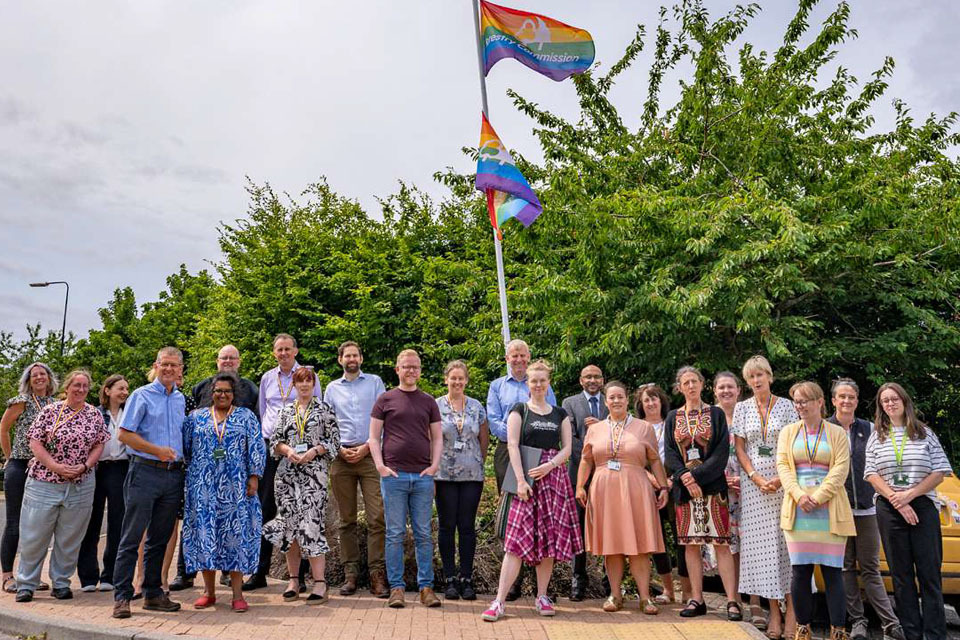
Rainbow Canopy celebrating Pride. Copyright Forestry Commission
The Women’s Staff Network
continues to grow and thrive Over the last 12 months, our Women’s Staff Network has hosted a range of activities and events, open to everyone working for the Forestry Commission.
The network has held online discussions about caring responsibilities, psychological safety at work, and the menopause. These safe spaces have allowed for informal discussions around these topics, led by a member of the network. Alongside the network discussion sessions, the Women’s Staff Network book club takes place every three months and offers the chance for colleagues to come together to discuss a suggested book for that quarter.
Getting out and about, in May 2023 the network organised staff wellbeing walks from the Bristol, Haldon, Dalby and Alice Holt sites during National Walking Month.
In January 2024, the network focused on promoting positive mental health and wellbeing through activities themed ‘Brew Monday,’ the campaign to positively challenge the notion of ‘Blue Monday’ (the day in January that has been named as the most depressing of the year). Alongside hosting individual team and office tea breaks and quizzes, the network held an online introduction to meditation session, which attracted 55 colleagues.
The network also continues to support the Forestry Commission’s work for better female fit PPE, publishing a blog for International Women’s Day 2024 to highlight the work on this project so far. On International Day of Women and Girls in Science (8 February) Dr. Suzie Robinson, Climate Impacts Modeller at Forest Research delivered a ‘Lunch and Learn’ session where she shared her journey, discussing the triumphs and challenges of being a woman in mathematical and climate science fields.
REACH (Race Equality and Cultural Heritage) staff network
During Black History Month in October 2023, The Forestry Commission Diversity and Wellbeing Manager Wali Rahman delivered a talk on Why Black History Month matters for APHA (Animal and Plant Health Agency) and DEFRA (Department for Environment, Food and Rural Affairs), which was attended by 213 civil servants from 40 departments.
Other events organised by the network included Faith, environment and harmony: Judaism and climate action with Rabbi Jonathan Wittenberg from the New North London Synagogue and Inclusive outdoors: embracing diversity in nature with Haroon Mota founder of the Active Inclusion Network. These events were attended by over 150 colleagues from across the Civil Service.
The network also continues to be connected to the Civil Service Race Forum.
DNC (Disability, Neurodivergence and Carers) staff network
During Disability Pride Month in July 2023 DNC hosted a webinar by Business Disability Forum on Disability inclusion in the workplace.
The network’s co-chair Katherine Patterson also produced resources to support staff and managers with regards to disability inclusion in the workplace. This included support with workplace adjustment passports and a new toolkit for neuro-inclusive meetings.
Forests for Everyone programme
Two years on from the launch of the Forests for Everyone programme in 2022, we are pleased to report that from the original 33 projects within the programme, 24 have been successfully delivered, seven have been completed, with the final two projects due to complete by September 2024.
The establishment of the Forests for Everyone network group was one of the original projects. The network now meets every three months, and is open to all colleagues in the Forestry Commission. This collaborative space serves as a platform where colleagues can learn from each other, adapt approaches, and collectively overcome obstacles to ensure that our nation’s forests are accessible and inviting to everyone.
In June 2023, the network held its inaugural faceto- face meeting at Westonbirt Arboretum. Over 30 colleagues gathered to reflect on the organisation’s current EDI practices, providing insights to inform the next phase of the programme. Participants also had the opportunity to participate in a ‘Sensing Nature Guided Walk’ led by a blind volunteer. Through this experience, they learned to identify distance through sound and describe the environment using touch and metaphor.
In addition to the Westonbirt meeting, the network has benefited from hearing presentations from colleagues on their work programmes. Our Community Outreach Ranger delivered a session on establishing meaningful engagement with diverse communities, and our Active Forests Health and Community Officer has shared insights on funding available for social prescribing initiatives. The two posts created under the programme continue to go from strength to strength delivering engagement with diverse and under-represented communities, supporting their needs in engaging with the nation’s forests and developing national level partnerships.
David Rose, Forests for Everyone Community Programme Manager has been working tirelessly establishing relationships with key community groups up and down the country representing different cultures and religions. Beyond the delivery of the original projects the broader Forests for Everyone programme continues to advocate for better, deeper, and more inclusive engagement with diverse communities and underserved audiences.
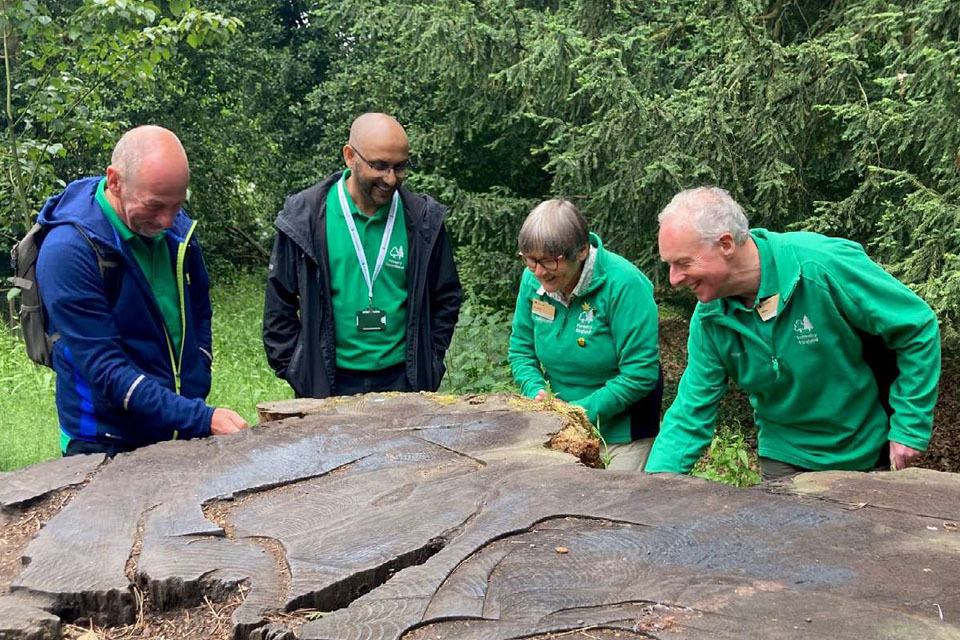
Forests for Everyone. Copyright Forestry Commission
Welcoming asylum seekers and refugees to Westonbirt
In August 2023, the Engagement Team at Westonbirt Arboretum welcomed 68 asylum seekers and refugees, alongside support staff from the charity Bridges for Communities. The team, supported by their community volunteers, had the pleasure of leading three guided walks around the Old Arboretum for adults and children from a range of countries including Afghanistan, Albania, Cameroon, Iraq, Iran, Lebanon, Mali, Somalia, Sudan, Syria, Turkey, Pakistan and Yemen.
The visiting groups explained that they often feel lonely, isolated and stressed by the uncertainty of their current situation. The walks were easy-going strolls, with the aim of giving everyone the chance to enjoy being in the open air and feeling the wellbeing benefits of nature, whilst connecting with others and having some fun. Since 2014, Westonbirt’s Community Programme has been bringing new audiences to the arboretum, reaching out to groups of people from more diverse communities to support positive mental health and wellbeing, through a diverse programme of onsite and outreach activities. Read more about Community Programmes at Westonbirt Arboretum.
Women in Forestry exhibition
A ‘Women in Forestry’ exhibition took place between May and December 2023, revealing the new artwork created by the People’s Picture. The exhibition was free to view at Grizedale Forest.
The centrepiece of the exhibition is the giant (12 square metre) photo mosaic created by the People’s Picture featuring over 2,000 publicly submitted photographs of women from across the forestry sector and general public, celebrating their contribution and connection with our woodlands. It depicts a portrait of Kathleen Houghton who joined the Women’s Timber Corps in 1941 as a lorry driver despite having never driven a car before. During the war she delivered urgent loads of pit props for coal mines to Plymouth Station.
Read a blog reflecting on the opening of the exhibition by Kate Hawley, Area Operations Manager for the Yorkshire and North East team: From lumberjack to lumberjill: why forestry isn’t just for men. Visit the digital version of the exhibition Faces in Forestry.
Partnership working and sharing good practice
Award winning diversity and inclusion efforts
The Forestry Commission was awarded the Certificate of Excellence in EDI at the Stepping Up 5th Anniversary Celebration at Bristol City Hall in May 2023.
The Forestry Commission Diversity and Wellbeing Manager Wali Rahman graduated from the Stepping Up Diversity Leadership programme in June 2023 and also received the Rising Star Award 2023. Wali was also recognised in the EqualityX Top 50 Influential Muslims in Europe list 2023.
In December 2023, the Forestry Commission was announced as the winner of the Includability D&I (Diversity and Inclusion) Star Award, recognising outstanding efforts in diversity and inclusion awareness and support in the workplace for 2023.
Includability is a community of companies committed to creating an inclusive and amazing workplace culture. Its members include: Business Disability Forum, Chelsea Football Club, Liverpool Football Club, Ecologi, Ella’s Kitchen, Bath & North East Somerset Council, Lexxic, Mencap, Nationwide and many other organisations that would have also been considered for the award.
We were chosen from five shortlisted members by Includability’s Verification Partner, ODISEE Ltd, as recognition that we have gone above and beyond to foster a diverse and inclusive work environment for our employees.
The Forestry Commission Diversity and Wellbeing Manager was invited to take part in several events including:
- a D&I roundtable exploring the theme ‘fostering holistic growth in the workplace’ brought together D&I leaders to share best practice from across the private and public sectors including, Ernst & Young, London Stock Exchange, KPMG, Lloyd’s of London, College of Policing, Bank of England, NHS, FT, House of Lords, House of Commons, Google, Apple and others
- the Women Empowering Defence’s International Women’s Day 2024 celebration event at Amazon HQ in London
- a Civil Service Race Forum and US Embassy partnership Diversity and Inclusion event at the US Embassy in London. Diverse panellists from US and UK governments shared their stories and experiences of navigating their careers
Celebrating diversity
A Diversity and Inclusion calendar has been published for 2024, which has helped to inform our communications plan for internal and external engagement. It also raises awareness of key dates affecting our stakeholders and wider society.
The diversity and inclusion communications included blogs on tattoos in the workplace, neurodiversity and Ramadan among other topics.
The Forestry Commission gender pay gap continues to improve
The Forestry Commission gender pay gap for 2022-23 was 2.84% (mean) and 0% (median).
The mean has decreased since the 2021-22 pay gap which previously had been 3.07% and the median has increased slightly where it was -0.28% last year. This meant that the middle female salary was 0.28% higher than the middle male salary.
We have continuously made significant efforts to reduce the gender pay gap. We are committed to ensuring equality of opportunity for all our employees and continue to reduce the gender pay gap.
The proportion of female employees in the Forestry Commission has increased by 1.4% since 2022 to 45.3%.
Forestry work, particularly operational roles, has historically attracted fewer female candidates than male candidates. This imbalance is improving and the proportion of female employees has increased over the past few years from 35% to 45.3%.
There are several programmes underway to further improve inclusivity and equality at the Forestry Commission where we are making significant and sustained progress. These are outlined in the gender pay gap report.
Diversity and inclusion in recruitment
A Diversity and Inclusion page has been added to the updated Forestry England careers page, as well as the graduate recruitment page.
A project to build up a media library of staff from diverse backgrounds and roles was started in order to improve visual representation for use with job advertisements, webpages, reports and social media content.
A long-term commitment to support wellbeing
Following our participation in Mind’s Workplace Wellbeing Index survey last year, the Forestry Commission (Forest Services and Forestry England) was awarded Silver in Mind’s Workplace Wellbeing Awards 2022-23.
A Silver award means we are making demonstrable achievements in promoting staff mental health, taking action across a number of key areas and demonstrating impact. This is an improvement on the Bronze award from when we last participated in 2018.
Some key results that contributed to the award are:
- 70% feel the organisation encourages openness and discussion about mental health
- 82% feel that Forestry Commission runs initiatives to raise awareness of mental health
- 77% of staff feel their manager encourages a healthy work/life balance
- 85% of staff say that Forestry Commission offers flexible working arrangements to help balance work and home demands
- 75% of staff felt supported when they disclosed poor mental health.
- 88% of staff are aware of support tools available
588 employees took part in the Workplace Wellbeing Index (a 36% response rate), and 225 respondents were line managers.
A wellbeing action plan is currently in development, which will incorporate the findings of the Mind report, staff engagement survey 2024 and consultations with multiple stakeholders.
In addition, over 430 flu vouchers issued in 2023, free period products were rolled out across Forestry Commission offices and sites and and 12 Mental Health First Aiders were given Suicide First Aid training.
Forest Research last participated in 2019 and will look to participate again in a future index but did not participate in this 2022-23 index.
Case studies
These case studies give you a glimpse into just some of the projects and programmes we run at the Forestry Commission; welcoming everyone into our forests and growing an environment where equality, diversity and inclusion benefits all our employees and citizens across the country.
Significant accessibility improvements to the Forest Research Northern Research Station
The number of staff based at the Northern Research Station (NRS) in Roslin has increased considerably in the last four years. The site was built in the 1970s and there was a significant need to upgrade facilities to support a growing and diverse workforce. Alongside changes to meeting spaces for improved collaboration, fire safety upgrades, and enhanced IT and AV provisions to better support blended and remote working, the team prioritised improving the accessibility of the site for all staff and visitors. The programme of upgrades included level access entrances and exits with wider automated doors, improved gender-neutral and accessible toilet facilities, additional showers and changing rooms, induction loops in recreation and meeting spaces, and a range of office environments to better support neurodiversity.
It also included enhanced colour schemes and breakout facilities to enable collaboration and increase wellbeing.
The Estates team are currently planning an accessibility audit to ensure that future improvements can be made to make the space more inclusive.
Accessibility improvements are also currently underway at Alice Holt, the Forest Research site in Hampshire and the location of the Holt laboratory.
Stepping up to leadership
Last year, as part of our Diversity and Inclusion Strategy, the Forestry Commission was able to fund three places on the Stepping Up 2023 Diversity Leadership programme.
Stepping Up aims to unlock potential and develop talent while ensuring a fair representation of Black, Asian and Minority Ethnic, disabled, women and LGBTQ+ staff in positions of leadership.
Manali Mahyavanshi, Forestry England Digital Marketing Coordinator, is one of two Forestry Commission colleagues who took part in the Stepping Up programme in 2023. The other participant was Neil Seegobin, a Project Manager at Westonbirt Arboretum.
Manali shares why the programme has made such a positive impact on her and her work. She said:
The Stepping Up programme has been a transformative experience in my journey of intentional career planning and personal growth. Emphasising career intentionality, the programme has guided me to fine-tune my goals and develop a clear vision for my future. The carefully crafted workshops and activities have pushed me to reflect deeply on my strengths, areas for improvement, and unique competencies. In doing so, I found I gained a stronger sense of self-awareness, which is critical in crafting a career path that not only meets my aspirations but also aligns with my core values and skills.
In terms of personal development, the Stepping Up programme underscored the importance of continuous learning and adaptability. It is said that stories shape who we are, how we relate to others, and how we make sense of the world. Each Stepping Up session provided real-world stories, insights, and first-hand experiences that challenged me to think differently and encouraged me to step outside my comfort zone.
These interactions were instrumental in broadening my perspective and sharpening my decision-making abilities, and they taught me the importance of learning and being ready for change.
The programme also helped me to meet people from different fields and backgrounds, all united by the common goal to ‘step up’. Making friends with others in the same situation and finding mentors has been invaluable. For a woman in today’s professional landscape, I feel that the Stepping Up programme serves as a great empowerment tool. For me, the programme has acted as a catalyst for positive change. The experience has honed my ability to set achievable goals, boosted my confidence in professional environments, and expanded my toolkit for success!

Manali (far left) and her workshop group sharing one of their team exercise. Copyright Forestry Commission
Crossing Thresholds: the Civil Service programme that offers a structured and supportive environment for women to develop their careers and achieve their potential
Bianca Ambrose-Oji, Head of the Society and Environment Research Group at Forest Research, is currently taking part in the programme which helps to unlock the barriers to career progression that women in the Civil Service may face.
The course, which runs for a year and consists of formal peer group sessions and a mentorship, is an opportunity to meet, work and share experiences with other women across the Civil Service.
Bianca says:
I‘ve learned so much from the programme. The formal sessions with my peers have been incredibly insightful and an opportunity to learn about the challenges facing other women in the workplace.
We’ve looked at how we can prioritise the right types of activity – in and outside of work – to achieve more balance in our lives. I’m already managing my time much more effectively and I’m approaching conversations with my team differently too.
Next, we are looking at what it means to have a personal brand and how we can best present ourselves as effective leaders. I’ve gained a great deal from the programme so far; it’s been a confidence boost and I’m enjoying being part of a group of supportive women who prioritise listening to and learning from each other.
Forestry England Central District’s diversity and inclusion research and development
Over 150 research points have been explored to develop the Central District team’s knowledge of how different communities, groups and individuals engage with the outdoors; particularly looking at communities that are underrepresented in the district. The data set reviewed ranges from quantitative reports to qualitative lived experience accounts. Looking at work carried out by other organisations as well as views of individuals from diverse backgrounds has supported the generation of an evolving strategy with a balanced perspective.
As a result of the research, major barriers to accessing the outdoors were identified.
The team developed a wealth of contacts and links, and from this over 30 meaningful meetings have been held with external organisations to discuss direct and indirect engagement, as well as collaboration with activities they plan to carry out. Contributions have been made to several networks that are mainly focussed on health and wellbeing. A broad range of information has been shared, particularly on the topic of barriers for people of colour, and other disenfranchised or marginalised groups or individuals.
Two welcome events were held as a pilot to test engagement and have been useful as a foundation for the current outreach path and Feel Good in The Forest project that will offer individuals a chance to become familiar with Forestry Commission sites. Accessibility has been improved across some of our community woodlands in the north west including improving path conditions and gateways into the woodlands.
In addition, the following actions were carried out:
- improved facilities at Forest Centres with the addition of Changing Places Toilets in Sherwood Pines, Nottinghamshire, Salcey Forest and Fineshade Woods in Northamptonshire
- accessible parking and some trail surfaces in Sherwood, Salcey and Fineshade
- more inclusive play opportunities in Salcey Forest, to support a diverse range of needs and to help more people enjoy the natural environment with different senses
- the team carried out two surveys looking at inclusive play and cycling at Hicks (692 responses) and Fineshade (200 responses). There is also a focus group at Fineshade, of seven people, that helped to create the inclusive play principles for the play equipment tender requirements
- improved car parking at Salcey, Delamere, Sherwood and Blidworth
- risk assessed paths for trampers and improved accessible paths at Sherwood and Salcey
- improved visitor centre accessibility at Fineshade
- added sensory play features at Fineshade and Salcey
- accessibility audits at five Forest Centres
Barriers identified:
- awareness
- equipment
- accessibility
- expectations/policing
- language
- safety/confidence
- representation
- underprivilege
- individual/cultural factors
Appendix
Recruitment data
The information below includes employment data collected between 1 April 2023 and 31 March 2024 for Forestry Commission employees. On 31 March 2024, the Forestry Commission had 2339 employees. Of these:
Disability
- total applicants who have a disability: 10.4%
- total applicants who do not have a disability: 84.5%
- total applicants who prefer not to say whether they have a disability: 5.1%
- interviewed applicants who have a disability: 10.2%
- interviewed applicants who do not have a disability: 83.8%
- interviewed applicants who prefer not to say whether they have a disability: 6.0%
- successful applicants who have a disability: 8.9%
- successful applicants who do not have a disability: 85.9%
- successful applicants who prefer not to say whether they have a disability: 5.2%
Ethnicity
- total ethnic minority applicants: 21.6%
- total white applicants: 74.0%
- total applicants who prefer not to state their ethnicity: 4.4%
- interviewed ethnic minority applicants: 6.8%
- interviewed white applicants: 89.4%
- interviewed applicants who prefer not to state their ethnicity: 3.8%
- successful ethnic minority applicants: 6.1%
- successful white applicants: 89.3%
- successful applicants who prefer not to say their ethnicity: 4.6%
Gender
- total male applicants: 55.9%
- total female applicants: 40.4%
- total applicants who prefer not to state their gender: 3.1%
- interviewed male applicants: 44.9%
- interviewed female applicants: 51.3%
- Interviewed applicants who prefer not to state their gender: 2.9%
- successful male applicants: 43.3%
- successful female applicants: 54.0%
- successful applicants who prefer not to state their gender: 2.1%
Age
- total applicants who are aged 39 or below: 68.8%
- total applicants who are aged 40 or over: 27.8%
- total applicants who prefer not to state their age: 3.4%
- interviewed applicants who are aged 39 or below: 60.4%
- interviewed applicants who are aged 40 or over: 36.7%
- interviewed applicants who prefer not to state their age: 2.9%
- successful applicants who are aged 39 or below: 57.9%
- successful applicants who are aged 40 or over: 39.3%
- successful applicants who prefer not to state their age: 2.8%
